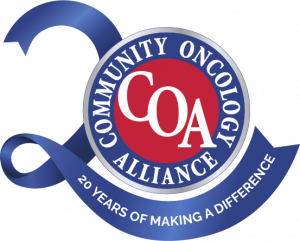Community Oncology Alliance Releases Formal Position Statement on Prescription Drug Affordability Boards
COA Urges Careful Implementation of PDABs to Avoid Negative Impact on Patients and Practices, Calls for Input from Independent Oncology Providers
WASHINGTON, D.C., UNITED STATES, May 25, 2023/EINPresswire.com/ -- The Community Oncology Alliance (COA) Board of Directors has issued a new position statement on state prescription drug affordability boards (PDABs), calling for careful consideration of any policy suggestions that are put forth and how they might be implemented.Oncologists strongly support the work of state policymakers to lower the cost of prescriptions for patients with cancer and other serious diseases. However, COA believes that these efforts must include expert input from independent, community oncology providers. Additionally, any major policy changes must be carefully considered to avoid unintended negative impacts on patient access to cancer providers.
• Click here to read COA’s latest position statement on PDABs.1
The cost of cancer care has risen dramatically over the past two decades, due in part to new treatments, interference from supply chain middlemen like pharmacy benefit managers, and the growing shift of care to the much more expensive hospital setting where drug and service costs are marked up significantly.
To try addressing drug costs, some states have established PDABs to review drug pricing and develop reforms, such as establishing an upper payment limit (UPL) for drugs. Since 2017, eight states have established formal PDABs (Colorado, Maine, Maryland, Massachusetts, New Hampshire, New York, Oregon, and Washington) and several other states have considered them or created similar informal bodies. PDAB members are usually appointed by that state’s governor and are made up of representatives from the health care, insurance, economic, and advocacy fields.
The goals of PDABs in addressing the high cost of cancer care are admirable and supported wholeheartedly by COA. Every day, community oncologists witness firsthand the devastation that the high cost of cancer care can have on patients. However, COA cautions against rapid implementation of PDAB proposals without input from key stakeholders and consideration of the potential impact they might have on other parts of our complex health care system, such as independent practice operations.
Since cancer and supportive treatments constitute the majority of high-cost medications, COA’s position is that that an oncology professional must be included in PDAB board membership. The perspective of an independent provider who interacts with specialty cancer medications on a daily basis, understands the various actors in the supply chain, and knows the real-world nuances of preparing, handling, and delivering these specialized treatments will help PDABs create more successful policy recommendations.
COA also stresses the importance of careful consideration of PDAB proposals, such as the most common UPLs. UPLs are an appealing and “simple” solution to curb costs for consumers. However, if payments are not set appropriately, and the UPL is below the acquisition price, the ability for independent practices to keep their doors open becomes untenable. If practice economics are inadvertently upended by UPLs, practices will be forced to cut staff, decrease the number of patients they see, ration their drug supply, and/or close their doors. UPL policies should be carefully crafted with input from community oncology professionals and take into account the realities of practice economics and our complex drug delivery system.
“With so many Americans struggling to afford their health care, the creation of PDABs by states seeking solutions is understandable,” said Mark Thompson, MD, COA’s medical director of public policy. “But if not done with careful consideration and the input of community oncology professionals, PDABs could cause more problems than they fix.”
PDABs are very new, and as of the publishing of the position statement, there is little data to support the beneficial or harmful nature of their work. As time goes on, it is COA’s hope that states can use the recommendations of these boards to create public policy that lowers health care spending, supports a healthy citizenry, and maintains a strong environment for practices.
Each of COA’s formal position statements provides background, history, and detail on a key issue affecting cancer care. These statements are reviewed and vetted by the medical professionals who sit on the COA Board of Directors. Many cover issues that are part of legislation or policy under consideration by the Centers for Medicare & Medicaid Services, the United States Congress, state governments, and others.
A complete version of every COA Position Statement is available online at https://mycoa.communityoncology.org/education-publications/position-statements.
###
About the Community Oncology Alliance: The Community Oncology Alliance (COA) is a non-profit organization dedicated to advocating for community oncology practices and, most importantly, the patients they serve. For more than 20 years, COA has been the only organization dedicated solely to community oncology where the majority of Americans with cancer are treated. The mission of COA is to ensure that patients with cancer receive quality, affordable, and accessible cancer care in their own communities. More than 5,000 people in the United States are diagnosed with cancer every day and, deaths from the disease have been steadily declining due to earlier detection, diagnosis, and treatment. Learn more at www.CommunityOncology.org. Follow COA on Twitter at www.twitter.com/oncologyCOA or on Facebook at www.facebook.com/CommunityOncologyAlliance.
Drew Lovejoy
Community Oncology Alliance
info@coacancer.org
1 https://mycoa.communityoncology.org/education-publications/position-statements/coa-position-statement-on-prescription-drug-affordability-boards

